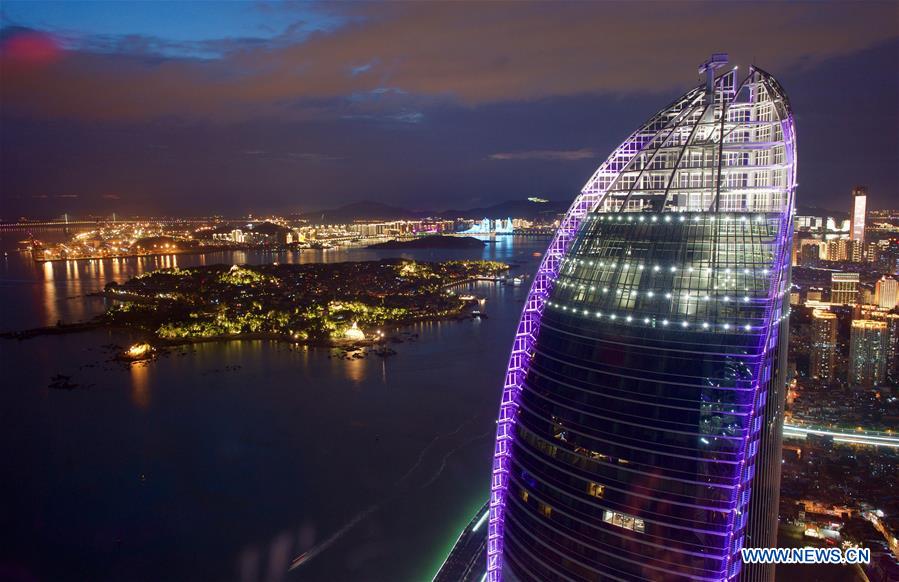BRICS to contribute more to global governance
Changes in the global landscape call for a solidified, stronger BRICS with better contribution to the global governance as the bloc of five emerging economies enters its second decade.

Photo taken on Sept. 4, 2017 shows the night view of Xiamen, host city for the 2017 BRICS Summit, in southeast China's Fujian Province. [Photo/Xinhua]
The 9th BRICS annual summit which was wrapped up on Tuesday in Xiamen has attracted worldwide attention to how Brazil, Russia, India, China and South Africa will shape the bloc's future course amid challenges and uncertainties stemming from global economic sluggishness, increased anti-globalization sentiments in Western countries, regional security and geopolitical blackswans, among others.
The bloc representing some 44 percent of the world population and 23 percent of the world economic volume is striving towards a stronger identity, a leading platform for South-South cooperation and a larger role in global governance.
Growing role in global governance
Former Goldman Sachs chief economist Jim O'Neill, who coined the acronym BRIC (made BRICS by South Africa's participation later), said the bloc's economic performance has exceeded his expectations.
"Sixteen years later the BRICS share of the global GDP (gross domestic product) is bigger than every scenario I projected," he noted.
Currently, the bloc's five economies together contribute more than half to global growth, serving as a major economic powerhouse.
"BRICS is at the center of solutions needed for international financial system reform," said Sergey Karatayev, deputy head of the Center for Economic Research at the Russian Institute of Strategic Studies, citing the increased voting rights of China and India in the International Monetary Fund and the World Bank.
According to the BRICS Leaders Xiamen Declaration released on Monday, the bloc will strive towards broad partnerships with emerging markets and developing countries, noting that the dialogue and cooperation with non-BRICS countries will be "equal-footed."
"With the BRICS demands, many global governance structures are undergoing a gradual reform," commented Srikanth Kondapalli, professor at the Center of East Asia Studies under the New Delhi-based Jawaharlal Nehru University.
"BRICS has acquired certain momentum in international relations," he added, highlighting the bloc's increasingly more unified voice in international affairs. "It has advocated dialogue and peaceful resolution of disputes, in addition to lifting any curbs on trade and investments," he said.
"It tries to protect the interests of developing countries," he added.
Leading platform for south-south cooperation
The just-concluded 9th BRICS Summit was a show of Chinese wisdom on South-South cooperation and global governance, leaving behind "BRICS Plus" as one of its most important legacies.
During the Xiamen Summit, China held the Dialogue of Emerging Market and Developing countries, where leaders of the five BRICS Plus countries of Egypt, Guinea, Mexico, Tajikistan and Thailand, were invited to join the BRICS leaders.
Iqbal Surve, Chairman of South Africa BRICS Business Council told Xinhua on the sidelines of the summit that he personally welcomes the BRICS Plus initiative. "That can only benefit the people of those countries," he said.
As Chinese President Xi Jinping put it in a Chinese saying, "It's easy to break one arrow but hard to break ten arrows bundled together." BRICS Plus is expected to expand the coverage of BRICS cooperation and enhance the strengths of the bloc in the international community.
Xi is now proposing a grand vision of global governance - stressing stability and mutual prosperity, Robert Lawrence Kuhn, chairman of the Kuhn Foundation and a longtime China expert and observer, told Xinhua via email during the summit.
"Properly positioned, BRICS can facilitate the continuing emergence of the largest developing countries to participate fully in a new kind of global governance, which humanity so badly needs in the 21st Century," said Kuhn.
A stronger self
Professor Kondapalli from Jawaharlal Nehru University believes there is plenty of potential to tap in intra-BRICS cooperation. "The total trade between the five BRICS countries accounted for only 4.9 percent of the total foreign trade of these countries," and "much of the trade is of low-end products," he said.
In addition to deepening economic and trade cooperation, increased cultural cooperation and people-to-people exchanges are deemed necessary for building a more stable and solid BRICS bloc.
"People-to-people exchanges are the pillar of all the bilateral and multilateral exchanges. It is the cultural capital of a country that has attraction and lays foundations of understanding between the peoples," said B.R. Deepak, sinologist and professor at the Jawaharlal Nehru University.
Deepak added that it is needed to institutionalize such mechanisms as cultural festivals, media and film exchanges, and BRICS scholarship programs.
There are also calls for the bloc's foreign ministers to meet regularly as part of its mechanism building efforts to further coordinate the bloc's voice on global political, security and economic issues.